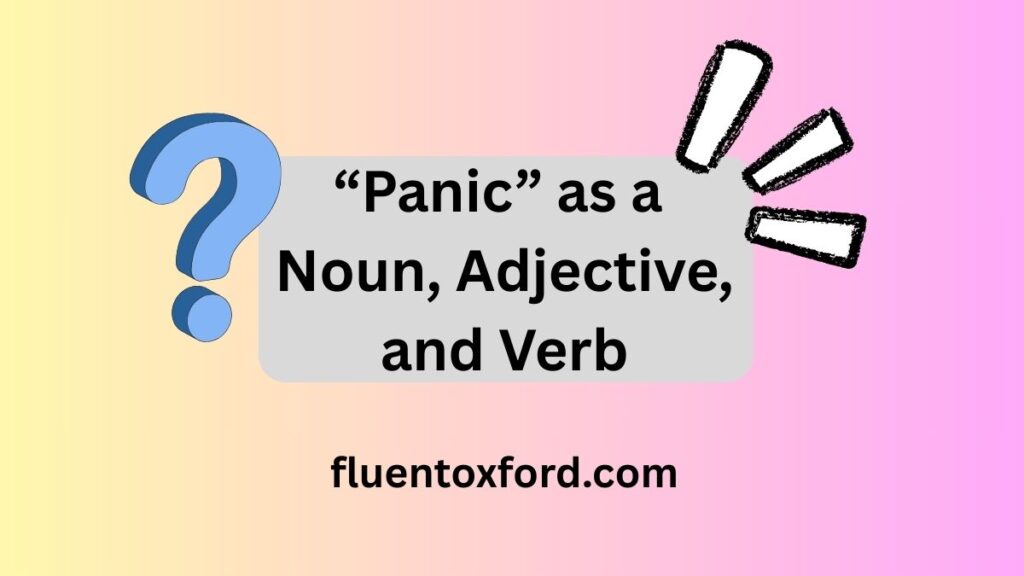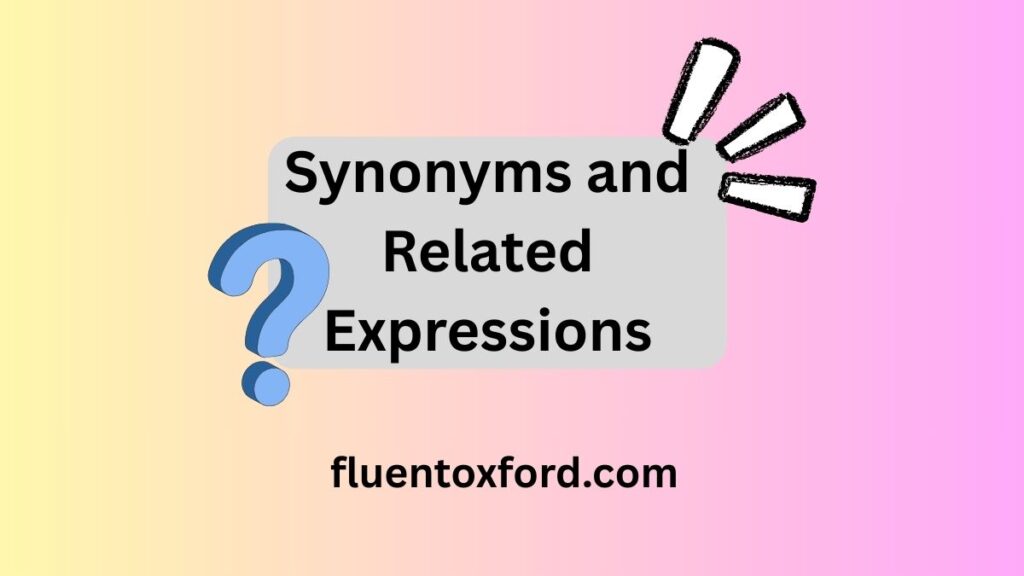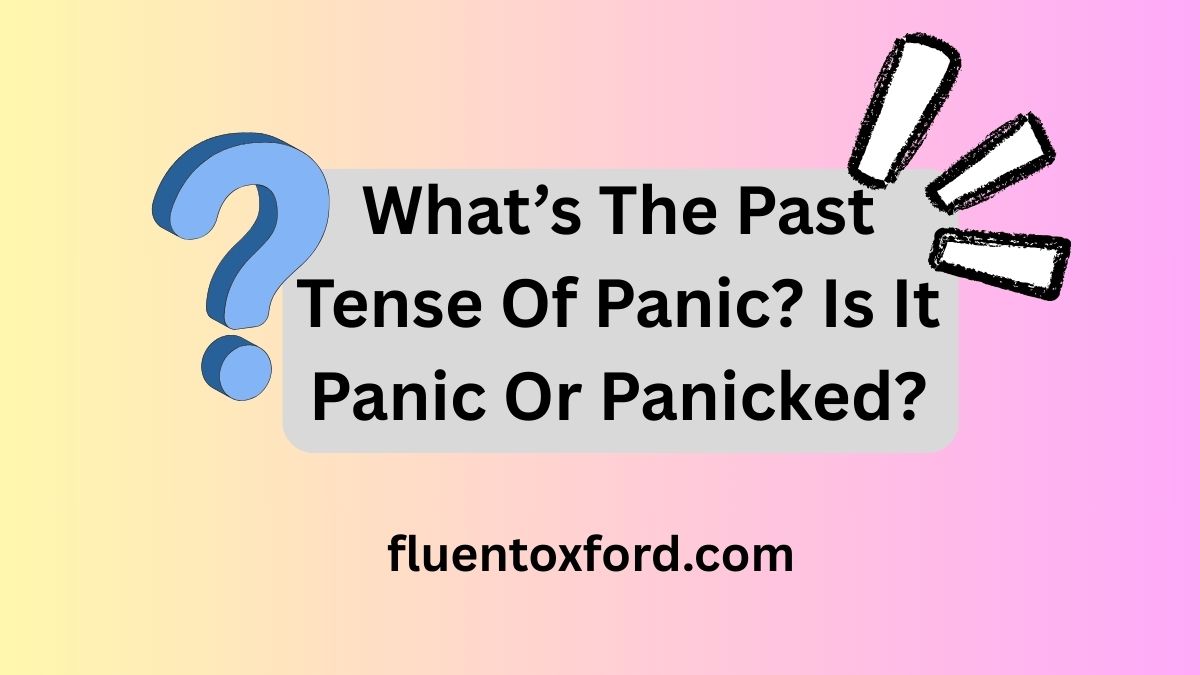The phrase “What is the past tense of panic?” refers to understanding how the verb “panic” changes when describing an action that occurred in the past. In English grammar, verbs shift forms to express different tenses, and this transformation is a crucial aspect of proper sentence construction. The verb “panic”, often used to describe a sudden feeling of fear or anxiety, must be correctly modified to reflect a past action. Choosing between “panic” and “panicked” may seem confusing, especially since the root word ends in a consonant + vowel + consonant combination, leading to questions about regular versus irregular conjugation.
In everyday speech and writing, even native English speakers hesitate when forming the past tense of certain verbs. That moment of doubt can spark curiosity, amusement, and even a touch of frustration. The confusion between “panic” and “panicked” is not just a simple grammar issue—it taps into the broader complexity of English language rules, where exceptions often rival the rules themselves.
Understanding what’s the past tense of panic can empower both learners and seasoned writers to communicate more clearly and confidently. The correct past tense—panicked—follows standard English patterns for verbs ending in “-ic” by adding a “k” before the “-ed” suffix. Delving into what is the past tense of panic reveals more than just a rule—it highlights the fascinating quirks of English verb formation that make the language both challenging and intriguing.
What Does “Panic” Mean?
At its core, panic refers to an intense and overwhelming feeling of fear, often irrational and caused by a sudden rush of anxiety. The word has multiple grammatical uses, each with subtle differences depending on context.
Here’s a breakdown:
- Origin: From the Greek god Pan, known to instill irrational fear.
- Modern meaning: A sudden fear or irrational emotional response, often intense and uncontrollable.
It can be a noun, adjective, or verb, and that flexibility is what often leads to confusion.
“Panic” as a Noun, Adjective, and Verb

Let’s look at how “panic” functions in different parts of speech. Understanding these roles helps clarify when and how panicked comes into play.
Panic as a Noun
Used to describe the feeling of fear or anxiety. It often happens in emergencies or unexpected situations. People may experience panic when they feel overwhelmed, unsafe, or unsure about what to do next. Panic can spread quickly in groups.
Example:
They felt a wave of panic when the power went out.
Synonyms:
- Alarm
- Dread
- Worry
- Hysteria
Related expression:
- Widespread panic — often used in news headlines to describe mass fear events.
Panic as an Adjective
Describes something related to or causing panic. For example, a panic attack refers to a sudden, intense feeling of fear. It shows urgency and distress, often leading to quick, uncontrolled actions or decisions in stressful situations.
Example:
There was a panic situation at the mall.
It’s not as commonly used in this form but still valid in contexts like:
- Panic attack
- Panic buying
Panic as a Verb
This is where we focus. As a verb, it means to suddenly become very afraid or anxious. When someone panics, they may lose control, think unclearly, or react quickly without planning. It often happens in emergencies or stressful moments, leading to rushed or irrational actions due to fear.
Examples:
Try not to panic.
Don’t panic during the exam.
This usage brings us to the big question: How do we talk about someone who panicked in the past?
The Correct Past Tense of Panic
Here’s the rule:
The past tense of “panic” is “panicked”.
Not “panic.” Not “panicing.” Panicked is the right form—and here’s why.
Why “Panicked” is Correct
When conjugating verbs in English, we often just add “-ed” to make the past tense. But with “panic,” a slight twist is required:
- “Panic” ends in a -c.
- English spelling rules say that when a verb ends in a consonant + “c”, you add -ked to maintain the correct pronunciation.
So:
| Base Form | Correct Past Tense |
| panic | panicked |
This keeps the hard “k” sound. Without the “k,” you’d end up with “paniced,” which would sound more like “panissed.”
Other Verbs That Follow the Same Pattern
These are rare, but they do exist.
| Verb | Past Tense |
| mimic | mimicked |
| traffic | trafficked |
| picnic | picnicked |
This spelling pattern comes from rules of English morphology—the study of how words are formed. It’s all about preserving pronunciation and clarity.
Why “Panic” is Not the Past Tense

You might hear people say “I panic yesterday,” but that’s grammatically incorrect. It’s an example of lexical ambiguity—the word “panic” is being misused because it can be both a noun and a verb.
Examples of Incorrect Usage:
❌ They panic when they saw the fire.
❌ They panic last night.
The correct form is:
✅ They panicked when they saw the fire.
✅ They panicked during the blackout.
How to Pronounce “Panic” and “Panicked”
Pronunciation matters—especially for non-native speakers. Let’s break it down:
- Panic: /ˈpænɪk/
- Panicked: /ˈpænɪkt/
Pronunciation Tips:
- The word “panicked” adds a hard “kt” sound at the end.
- The stressed syllable is always on the first part: PAN-ic, PAN-icked.
Helpful tools:
Use apps like Forvo or YouGlish for real-time pronunciation examples.
Verb Conjugation Table for Panic
| Tense | Example Sentence |
| Base form | I panic during presentations. |
| Third person (s) | They panics easily. |
| Past tense | They panicked during the interview. |
| Present participle | They are panicking right now. |
| Past participle | They had panicked too early. |
Understanding verb conjugation like this helps reduce mistakes in everyday conversations and writing.
Real-Life Usage Examples
Using “Panic” in Daily Conversation
- “Don’t panic—it’s just a fire drill.”
- “I panic every time I see a spider.”
- “Why do you panic over small things?”
Using “Panicked” in Past Situations
- “They panicked when they couldn’t find their phone.”
- “We panicked after hearing the loud crash.”
- “They panicked and called 911 immediately.”
These reflect real speech patterns and help you express feelings clearly and naturally.
Synonyms and Related Expressions

Sometimes you don’t want to repeat the word “panic.” Here are some alternatives that convey similar emotions:
Synonyms of “Panic” (Verb)
- Freak out
Lose emotional control
Example: They freaked out when they saw the spider. - Lose it
Become uncontrollably upset
Example: Alina completely lost it during the argument. - Fly off the handle
Suddenly lose temper or control.
Example: Haris flew off the handle when the plans suddenly changed. - Break down
Emotionally collapse suddenly
Example: They broke down when the pressure got too much. - Flip out
React in wild fear
Example: I flipped out when I lost my phone. - Get excited
Feel strong joy or enthusiasm.
Example: Ali got excited when his favorite band appeared on stage. - Get scared
Feel sudden fear
Example: They got scared after hearing the strange noise. - Lose composure
Fail to stay calm
Example: They lost her composure during the interview. - Get alarmed
Feel sudden worry
Example: People got alarmed when the lights flickered. - Overreact
Respond too strongly
Example: I overreacted to the harmless prank.
Synonyms of “Panicked” (Past Tense)
- Freaked out
Lost emotional control
Example: Baby freaked out when the lights went out. - Lost it
Became uncontrollably upset
Example: They lost it during the emergency. - Broke down
Emotionally collapsed suddenly
Example: I broke down after hearing the news. - Flipped out
Reacted in wild fear
Example: They flipped out when the elevator stopped. - Went berserk
- Acted wildly or uncontrollably.
Example: The crowd went berserk when the team scored the winning goal. - Got scared
Felt sudden fear
Example: I got scared during the thunderstorm. - Lost control
Couldn’t stay calm
Example: They lost control when they saw the accident. - Overreacted
Responded too strongly
Example: He overreacted to the harmless joke. - Got alarmed
Felt sudden worry
Example: The workers got alarmed by the loud noise. - Froze up
Couldn’t respond properly
Example: They froze up during the surprise attack.
These are great for writing fiction, conveying tone in messages, or simply adding vocabulary variety.
Grammar Tools to Help You Master Tenses
Learning irregular verb forms like “panicked” doesn’t have to be frustrating. Several grammar tools and apps make it easier:
Recommended Tools:
- Grammarly – Real-time correction for tense and grammar
- Hemingway App – Highlights readability and structure
- WordHippo – Explores conjugations and synonyms
- Daily Grammar – Offers quick lessons with daily updates
Using tools like these can eliminate confusion over similar language puzzles.
Fun Fact: Panic Isn’t Just a Feeling
What is Panic Grass?
Believe it or not, panic grass is a real plant. The name comes from the Latin word “panicum,” which refers to a type of grain—not fear. So while it sounds like it belongs in an anxiety-themed garden, it’s actually used in livestock feed and erosion control.
This shows how words can have multiple meanings depending on context—a common form of lexical ambiguity in English.
Quick Recap and Final Tips
Let’s wrap up with a checklist of what you’ve learned:
✅ Quick Takeaways:
- “Panicked” is the correct past tense of “panic.”
- Don’t use “panic” as past tense—it’s a common error.
- Pronounce “panicked” with a hard “kt” ending.
- Use grammar tools to reinforce learning.
- Don’t confuse the verb with the noun or adjective.
- Keep an eye out for lexical ambiguity—same word, different meanings.
- Words like panic grass have totally unrelated definitions
Conclusion
In conclusion, understanding what is the past tense of panic? helps improve your grammar and writing. The correct form is panicked, not panic. This follows the common rule of adding “-ked” to verbs that end in “-ic.” It may look a bit strange at first, but it is the proper way to show the past tense. Using the correct form makes your sentences clearer and more professional.
Learning what is the past tense of panic? is a small but important step in mastering English. It shows how small changes in spelling can affect meaning. Whether you are writing a story, speaking in public, or taking a test, knowing the right verb form will help you feel more confident. Keep practicing, and soon these rules will become easy to remember.
FAQs
Q1: What is the correct past tense of “panic”?
Answer: The correct past tense is “panicked”, not “panic.”
Q2: Why isn’t “panic” used as the past tense?
Answer: “Panic” is the base form; grammar rules require adding “-ked” to form the correct past tense, “panicked.”
Q3: Is “panicked” also an adjective?
Answer: Yes, “panicked” can describe someone’s state, as in “a panicked crowd.”
Q4: Is “panicing” a correct spelling?
Answer: No, the correct spelling is “panicking” with a “k” to preserve the hard “c” sound.
Q5: Are there any grammar tools to check verb tenses?
Answer: Yes, tools like Grammarly, Hemingway Editor, and WordHippo offer updated daily grammar checks for verb tenses and usage.

As an admin at Fluent Oxford, Maida Queen is the driving force behind our vibrant learning community. With a deep passion for English language education, she ensures that our platform remains a dynamic, engaging, and supportive space for learners worldwide.
Maida expertly manages content, assists users with their grammar and fluency queries, and fosters an interactive environment where learning feels effortless and enjoyable. Whether you need guidance, motivation, or just a friendly face in the Fluent Oxford community, Maida is always there to help you reach your English language goals.








